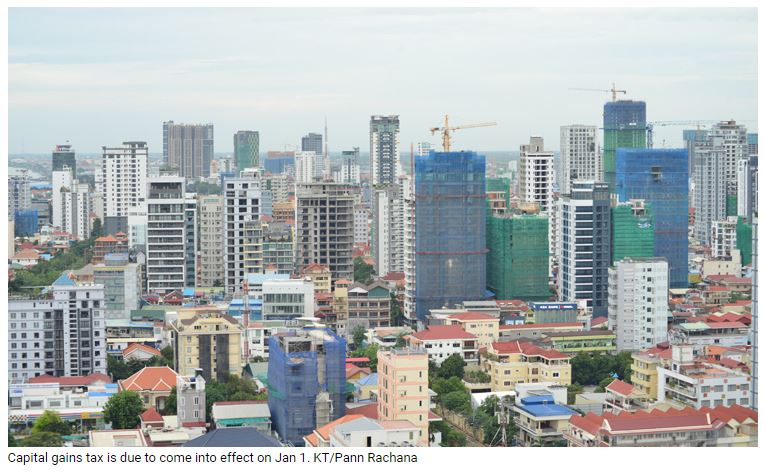Cambodia: Call to delay ‘welcome’ capital gains tax collection
Property insiders have applauded the government’s move on capital gains tax collection but asked for its delay until the COVID-19 pandemic ends.
Kim Heang, regional operating principal of the US-based real estate firm Keller William Cambodia, said it was a taxpayer obligation that is not a new thing in developing countries.
He said some may think there will be a huge negative impact on the sector, especially from those who seek to avoid tax payments.
“For me personally, I support the government’s measure on capital gains collection because when we make a profit from business we need to pay tax,” he said.
However, Heang said it should be delayed until the recovery of the economy.
“COVID-19 will not end until next year and now our economy is down and the real estate sector is in a difficult situation,” he said. “If we impose the tax during this period, we will make the sector worse and worse. We need to wait at least a few years until the economy recovers so it is not too late for the government.”
He said after the COVID-19 era ends, the economies in the region as well as in the world need time for recovery – and it is not the right time to implement capital gains tax collection.
“My suggestion is the government should wait until 2022 or 2023. It would help government revenue collection but in general affect the whole sector,” he said.
The Cambodian government says it will start to implement 20 percent capital gains tax from January next year, which will apply to all properties and other capital investments such as leasing, stocks as well as foreign currency.
Chrek Soknim, president of Cambodian Valuers and Estate Agents Association (CVEA), said countries in the region as well as around the world have already implemented the policy.
However, he said during this crisis, the sector is struggling to survive and the pandemic could last longer than expected.
“We are not opposed the government’s measure. Now transactions in real estate are already slowing down and, if we add capital gains tax, it will reduce the number of transactions,” he said. “In Cambodia, the tax is a new thing and, from my point of view, I think that we need to wait until the crisis ends.”
Soknim said it is good for the state that it could generate more revenue from tax collection but when the sector suffers as a whole, there will be consequences.
“We are discussing with our members what we should request or propose to the government
to delay it for a certain period,” he said.
However, he said the measure would not negatively affect the sector when the COVID-10 pandemic ends.
The World Bank has warned that the significant growth recorded in the construction and real-estate sector, considered one of the country’s economic pillars, could
ultimately affect overall growth because of a trinity of unanticipated and now negative factors.
In 2019, the construction and real estate sector garnered investment worth approximately $11 billion, a 90 percent rise on 2018’s figure of $5.5 billion. But the World Bank said that there are now significant downside risks that include
a local COVID-19 outbreak, a prolonged decline in tourist arrivals and real estate market correction.
The World Bank has offered some measures to lessen this gloomy outlook. Key to this is cushioning the potential effects of a real estate market correction, through implementing macro-prudential measures such as bank limits in terms of exposure to construction and tightening loan-to-value ratios, except for first-time home buyers.
Source: https://www.khmertimeskh.com/50759248/call-to-delay-welcome-capital-gains-tax-collection/


 English
English




